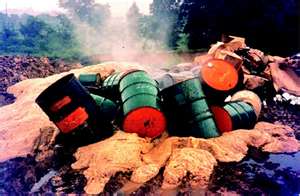 Sacramento, CA — In a letter to state senators, Consumer Watchdog called for an examination of the years-long failure of the Department of Toxic Substances Control to protect communities from dangerous industries near homes and schools. Senators have an opportunity to ask questions about these problems at today’s Rules Committee confirmation hearing for Gov. Jerry Brown’s appointee to head the Department of Toxic Substances Control.
Sacramento, CA — In a letter to state senators, Consumer Watchdog called for an examination of the years-long failure of the Department of Toxic Substances Control to protect communities from dangerous industries near homes and schools. Senators have an opportunity to ask questions about these problems at today’s Rules Committee confirmation hearing for Gov. Jerry Brown’s appointee to head the Department of Toxic Substances Control.
“Appointee Deborah Raphael has served as interim director of the DTSC for a year and is certainly familiar with the lack of public communication, hand-slap fines and consent agreements that keep serial toxic violators out of court and in business,” said Judy Dugan, research director of Consumer Watchdog, who will testify at the confirmation hearing today. “The Department has a special responsibility to working- and middle-class families in the small cities where companies produce and recycle toxics including PCBs, dioxin and heavy metals near homes and schools. The companies have mastered the arts of delay to avoid fixing leaks, poor infrastructure and careless internal safety controls.
Ms. Raphael’s environmental and consumer-protection credentials are not in question, said Consumer Watchdog. The letter simply asks that Senators seek details on her plans for strengthening and speeding enforcement and transparency at the DTSC. Senators should also explore whether she has the full support of Gov. Jerry Brown, who alarmed environmental and consumer advocates in December by dismissing two top oil safety regulators after industry complaints about zealous enforcement.
The letter provides examples of companies in Santa Fe Springs, and Newark, CA that have violated laws and regulations repeatedly without being forced to fully comply or face shutdown. It also described a shuttered recycling facility in National City that went nearly a decade without removing or fully securing dangerous waste piles. (See details in linked letter.)
The letter described the key problems at DTSC:
– Lack of transparency, which cripples local activists. The DTSC does not release or post original inspection reports or violation notices, and often forces citizens who seek documents affecting their communities to visit distant regional offices in person, at their own cost, to even find out what is publicly available on paper. Consent decrees scrubbed of details, or rare court enforcement actions, occur months or years after violations occurred. In the meantime, residents may live in fear of their own drinking water or the dust that is blowing into a school playground from a toxic industrial site.
– Disconnection between inspection and enforcement, and fragmentation of oversight among multiple state and local agencies. State inspections of toxic producers and waste sites are often performed by county-based agencies certified under Cal-EPA, while enforcement actions are in-house at DTSC. Local zoning, planning and development agencies may work at odds with community safety. DTSC appears to suffer from poor coordination and its own strong preference to settle violations rather than prosecute or sue even repeat violators. Certain companies, even frequent violators, have operated for decades on expired permits through delay, revision of proposals and claims of corporate poverty. Defunct companies may leave behind toxic piles, ignoring DTSC orders that they be permanently protected or removed.
– Weak out-of-court settlements. Consent orders, the most common response of the DTSC to toxic releases or other safety violations, assess fines that are often just a few thousand dollars, no more than a minor cost of doing business. Violations are tersely described, devoid of explanation that laypersons worried about their health and homes could understand. Some violations may be omitted or diminished as a result of negotiation with the violator–the extent of this cannot be determined without access to original inspection and violation reports. Correction is left to the violator, without regularly published follow-up reports.
– A “corruption of process” at the local level. City officials and agencies may be cowed by industry threats of lost jobs and tax revenue. The small cities and their industries operate largely under the radar of big-city media. Activists describe local regulators issuing permits and allowing expansions of toxic sites despite strong community protests, and feel no one is listening. While this corruption of process is not within the power of the DTSC to control, it makes DTSC the chief protector of the toxics-affected communities that ring larger urban areas.”
“California cannot let toxic industries trample communities just so officials can proclaim that the state is ‘business-friendly,’” said Doug Heller, executive director of Consumer Watchdog. “Neighborhoods where families fear for their children at school or where fires at toxic facilities threaten their homes signal a much bigger failure of government. Today’s hearing is a chance for lawmakers to affirm the state’s commitment to safe neighborhoods.”
Click here to read Consumer Watchdog’s complete letter.
– 30 –











